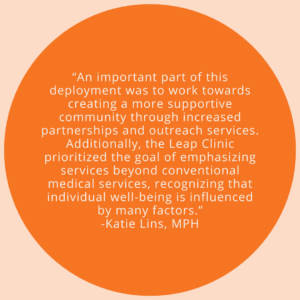 During her deployment with Leap Pediatric and Adolescent Care, Katie (MPH 2024) worked to increase awareness of community resources and improve understanding of their pediatric patient population. By developing needs assessments, creating newsletters, and highlighting community resources, she worked to improve overall patient well-being.
During her deployment with Leap Pediatric and Adolescent Care, Katie (MPH 2024) worked to increase awareness of community resources and improve understanding of their pediatric patient population. By developing needs assessments, creating newsletters, and highlighting community resources, she worked to improve overall patient well-being.
Deployment with Leap Pediatric and Adolescent Care
Leap Pediatric and Adolescent Care is a nonprofit clinic located in St. Paul, Minnesota that is run by UMN MCH alumni Dr. Julia Joseph-Di Caprio and focuses on removing barriers to health and wellness for pediatric children and adolescents. The Leap Clinic offers a wide range of health services from preventive care to illness management, working to meet the unique needs of all patients and families in St. Paul. In addition to providing traditional medical services, Dr. Julia emphasizes the importance of access to well-being services and health approaches that incorporate elements such as nutrition education and mental health support.
During my deployment with Leap, I worked in partnership with Katya Ivanchuk to complete our tasks and projects efficiently. We played on each other’s strengths to create products for Leap Clinic and achieved our objectives through the support of one another.
 Analyzing Specific Needs and Support Systems for Adolescents in St. Paul
Analyzing Specific Needs and Support Systems for Adolescents in St. Paul
Through my deployment with the Leap Clinic, I gained significant knowledge about the state of adolescent health in the St. Paul community and how to best support this population. My deployment project’s end goal was to increase awareness and use of community resources such as food education programs and no-cost mental health services. Our focus was on improving knowledge of the services that are available in the community of St. Paul for families who visit the Leap Clinic. An important part of this deployment was to work towards creating a more supportive community through increased partnerships and outreach services. Additionally, the Leap Clinic prioritized the goal of emphasizing services beyond conventional medical services, recognizing that individual well-being is influenced by many factors.
Products Created
We first completed a literature review to evaluate what informal resources, such as communication via social media platforms, were most commonly used to address adolescent health issues. We also identified developments, trends, and barriers adolescents were experiencing when connecting to professional healthcare services. The literature review involved us specifically researching ways to improve the social and mental well-being of adolescents. It included an analysis of many informal sources such as social media platforms, community services, and school-based support services. Additionally, this literature review assessed what health trends and barriers were being experienced by adolescents in both the state of Minnesota and the city of St. Paul.
I also helped create a needs assessment survey for the Leap Clinic to administer to patients and families. The survey was developed to gather valuable insights directly from the community, specifically those who access the Leap Clinic for health services. This survey needed to be made available in both a traditional paper-based method for in-person administration and an online form to encourage greater participation. Additionally, to accommodate all individuals, the survey was translated into three languages – English, Spanish, and Somali. With the results from the survey, the Leap Clinic can tailor its initiatives and allocate resources according to the specific needs of the community, such as requests for therapy or mental health services to use trauma-informed care models.
![With the results from the [needs assessment] survey, the Leap Clinic can tailor its initiatives and allocate resources according to the specific needs of the community, such as requests for therapy or mental health services to use trauma-informed care models. -Quote by Katie Lins, MPH](https://mch.umn.edu/wp-content/uploads/2024/09/AS-Katie-Lins-4-300x300.png) Some examples of questions from the needs assessment survey created for the Leap Clinic include:
Some examples of questions from the needs assessment survey created for the Leap Clinic include:
- “Using substances means doing things like drinking alcohol, taking marijuana or other THC products, or using illegal drugs. What can help young people avoid the use of substances?”
- “Do you think your family and other families would benefit from resources about young people’s use of social media and technology, like TikTok, and how it might affect how they feel and their relationships?”
- “Would it be helpful to know about community resources for wellness, including mindfulness, healthy eating, and being active?”
We also helped create resource lists for the Leap Clinic that listed services such as mental health support, nutrition education, food assistance, non-conventional health services, and resources that were culturally competent and serve specific populations and identities. Each resource was researched and carefully chosen to ensure relevance and credibility, to assist adolescents and families in making informed decisions about their health. The creation of resource lists that included more than typical health services, such as dental or eye care, was important to the Leap Clinic and will work to help create stronger support systems for the community.
We also crafted a newsletter for the Leap Clinic to release during May (National Adolescent Health Month) that featured upcoming community events, available community services, and other news such as interesting research findings around adolescent health. The goal of the newsletter was to increase awareness of services and events in the community of St. Paul and to provide useful information for patients and families who visit the Leap Clinic to improve health and well-being.
BIO
Katie graduated from the MCH MPH program in 2024 with a minor in Health Services Research, Policy, and Administration. Katie received her BS from the University of Minnesota, Twin Cities.
–Read Student Spotlight archives
Interested in learning more about getting a degree in MCH? Visit our MCH Program page for more information.
#UMNMCH #UMNproud #UMNdriven